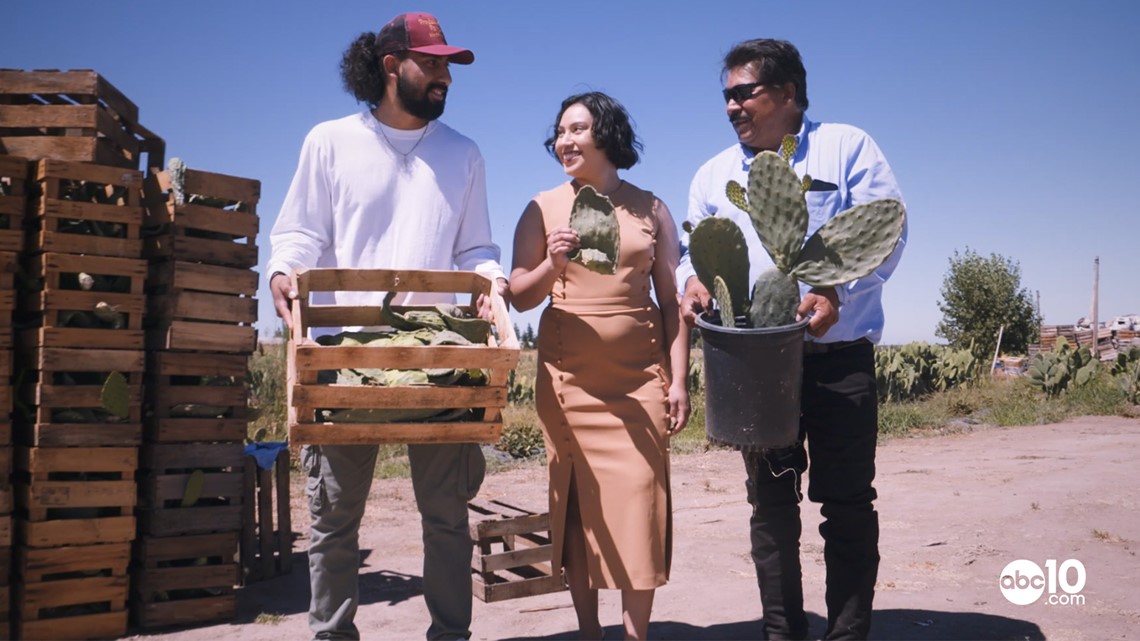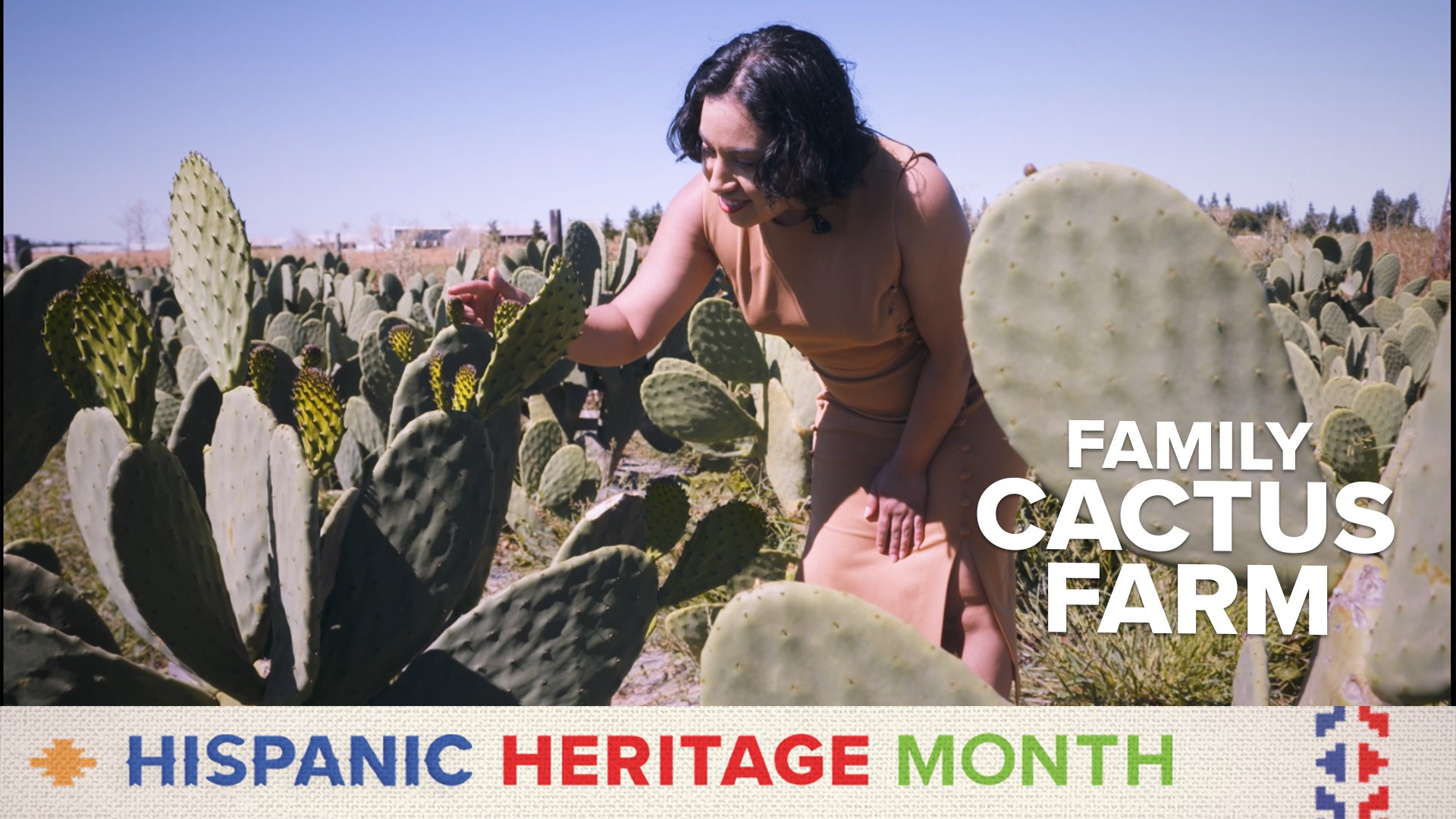STANISLAUS COUNTY, Calif. — The answer to “what’s for dinner” could be "cactus." A farming family in Stanislaus County is growing an age-old desert plant with the hopes of promoting its healthy and cultural benefits.
Nopales is a staple in most Hispanic households. It’s flavorful, relatively inexpensive and good for you. The only problem? It’s hard to find at most U.S. grocery stores, but a farming family in Oakdale is working to change that.
“We're striving to educate people about nopales so they are able to try it and just give it a chance,” said Denise Ruiz.
She is one of five family members who work at Products from Paradise, a cactus farm trying to make fresh nopales more accessible.
The Ruiz family is farming one of the largest edible cactus farms in California. The agriculture venture took a long time to grow.
“It’s not easy. I’m here for eight years and sometimes it's hard,” said Salvador Ruiz, Sr.
“Right now, there is not that many places that have it and if they do have it it's beaten up, it's almost rotten,” said Salvador Ruiz, Jr.
Everything on their 8-acre plot of land is planted, picked, marketed and sold by Salvador Ruiz, Sr., his wife and three adult children, but the family's farming roots go way back.
“All my family is in agriculture. I went to school in Mexico but the whole time I have an idea,” he said.
His idea was to build a pesticide-free organic farm. Unfortunately, Salvador had difficulty profiting from traditional California crops, but eventually he found success growing nopales.


Nopales are harvested from the prickly pear cactus, which is considered both a fruit and a vegetable, so it has complex flavors. The paddle-shaped branch, or nopal, is the vegetable part. The red colored pear, or "tuna fruta" in Spanish, is a fruit. Nopales can be eaten raw but, like most vegetables, they taste better cooked.
“Nopales, culturally, it's very important to Mexicans," said Denise Ruiz. "It's in the Mexican flag. It's also under the feet of Our Lady of Guadalupe.”
Nopales have been cultivated for food for over 9,000 years. The Aztecs used nopal for food and medicine. Sailors also used nopal to prevent scurvy, which helped spread the spineless prickly pear around the world.
The nopal is considered a “life-giving” plant because it never seems to die. If the pads on the plant fall or are ripped off, it can form a new plant.
“Nopales are considered a resilient plant, so that’s why it represents the resilience of the Mexican people and that’s why it was also chosen to be part of the Mexican flag,” said Denise Ruiz.
Prickly pear cactus grows in many hot or arid parts of the United States. It’s a drought tolerant plant, but few farmers north of the border know how to grow or process nopales on a large scale. Before you can eat nopales, all the thorns must be removed by hand.
It takes lots of practice but the people who prepare nopales everyday can do a box in 20 minutes, says Ruiz, Sr.
GET MORE RACE & CULTURE FROM ABC10:
►Explore the Race & Culture home page
►Watch Race & Culture videos on YouTube
►Subscribe to the Race and Culture newsletter
Marketing and scaling up their operations are challenges the Ruiz family is overcoming. They’ve received grants to expand refrigeration in their fruit stand, and they are working with local food banks and restaurants to get nopales-based meals on more dinner plates.
“We always get compliments because people are always like, 'Wow it's so hard to have a family business; how do you guys do it?' and really it's love and communication. We have that,” said Denise.
Nopales are a versatile plant. They can be used in flavored drinks, beauty products and even the pesky beetles that eat the cactus can be used to make clothing dye. It’s that versatility that gives the Ruiz family hope for expansion in the future.
“The plant, I made an analogy once. Even if the plant falls down it gives fruit, it still keeps growing and it can be used for many things, and I compare that to us. We can be successful. We can do anything,” said Salvador Ruiz, Jr.
Follow the progress of the Nopales harvest at productsfromparadiseco.com
MORE HISPANIC HERITAGE MONTH STORIES FROM ABC10: Deeply Rooted: a soccer team's mission to give young players in the community their dream.
We want to hear from you!
The Race and Culture team's mission is to serve our diverse communities through authentic representation, community engagement and equitable reporting.
Accomplishing our goals of inclusive reporting requires hearing from you. Is there a person or place that you want us to highlight. Email us at raceandculture@abc10.com or fill out the form below.

